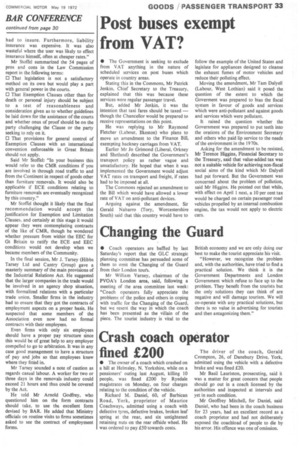Post buses exempt from VAT?
Page 35

If you've noticed an error in this article please click here to report it so we can fix it.
• The Government is seeking to exclude from VAT anything in the nature of scheduled services on post buses which operate in country areas.
Stating this in the Commons, Mr Patrick Jenkin, Chief Secretary to the Treasury, explained that this was because these services were regular passenger travel.
But, added Mr Jenkin, it was the intention that taxi fares should be taxed — though the Chancellor would be prepared to receive representations on this point.
He was replying to Mr Raymond Fletcher (Labour, Ilkeston) who plans to move an amendment to the Finance Bill, exempting hackney carriages from VAT.
Earlier Mr Jo Grimond (Liberal, Orkney and Shetland) described the Government's transport policy as rather vague and unsatisfactory. He hoped that when it was implemented the Government would adjust VAT rates on transport and freight, if rates had to be imposed at all.
The Commons rejected an amendment to the Bill which would have allowed a lower rate of VAT on anti-pollutant devices.
Arguing against the amendment, Sir Gerald Nabarro (Tory, Worcestershire South) said that this country would have to follow the example of the United States and legislate for appliances designed to cleanse the exhaust fumes of motor vehicles and reduce their polluting effect.
Moving the amendment, Mr Tam Dalyell (Labour, West Lothian) said it posed the question of the extent to which the Goverment was prepared to bias the fiscal system in favour of goods and services which were anti-pollutant and against goods and services which were pollutant.
It raised the question whether the Government was prepared to put teeth into the orations of the Environment Secretary and others who paid lip service to the needs of the environment in the 1970s.
Asking for the amendment to be resisted, Mr Terence Higgins, Financial Secretary to the Treasury, said that value-added tax was not a suitable vehicle for achieving non-fiscal social aims of the kind which Mr Dalyell had put forward. But the Government was concerned about the problem of pollution, said Mr Higgins. He pointed out that while, with effect on April 1 next, a 10 per cent tax would be charged on certain passenger road vehicles propelled by an internal combustion engine, the tax would not apply to electric cars.




























































































































